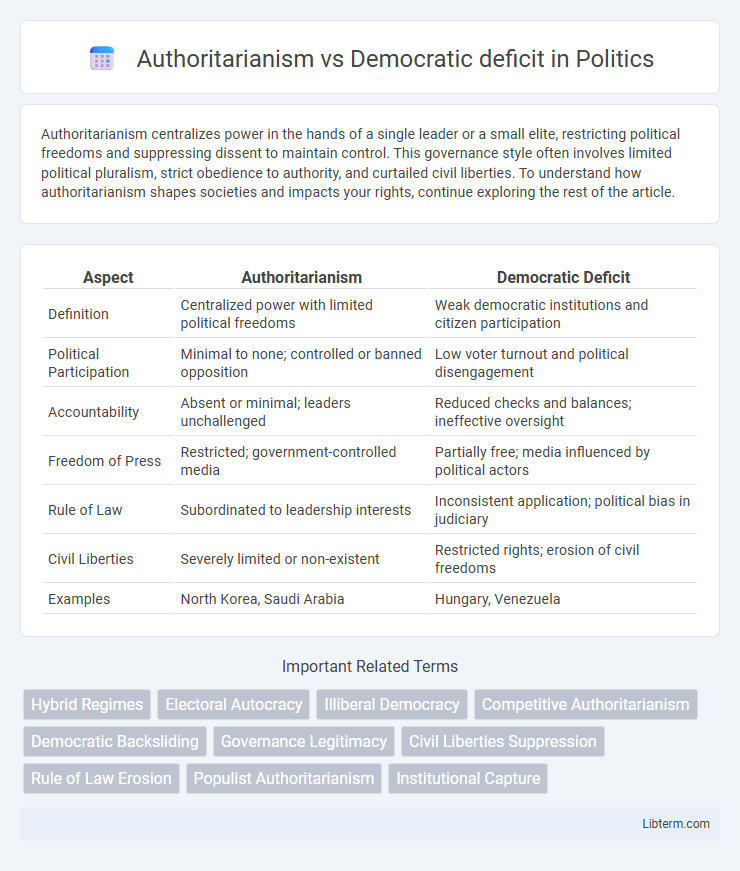Authoritarianism centralizes power in the hands of a single leader or a small elite, restricting political freedoms and suppressing dissent to maintain control. This governance style often involves limited political pluralism, strict obedience to authority, and curtailed civil liberties. To understand how authoritarianism shapes societies and impacts your rights, continue exploring the rest of the article.
Table of Comparison
| Aspect | Authoritarianism | Democratic Deficit |
|---|---|---|
| Definition | Centralized power with limited political freedoms | Weak democratic institutions and citizen participation |
| Political Participation | Minimal to none; controlled or banned opposition | Low voter turnout and political disengagement |
| Accountability | Absent or minimal; leaders unchallenged | Reduced checks and balances; ineffective oversight |
| Freedom of Press | Restricted; government-controlled media | Partially free; media influenced by political actors |
| Rule of Law | Subordinated to leadership interests | Inconsistent application; political bias in judiciary |
| Civil Liberties | Severely limited or non-existent | Restricted rights; erosion of civil freedoms |
| Examples | North Korea, Saudi Arabia | Hungary, Venezuela |
Understanding Authoritarianism: Core Features
Authoritarianism is characterized by centralized power concentrated in a single ruler or ruling elite, limited political pluralism, and restricted individual freedoms. Key features include the suppression of dissent, lack of free and fair elections, and control over media and civil society to maintain regime stability. Understanding these core elements helps differentiate authoritarian governance from democratic deficits, where democratic institutions may exist but function improperly or are weak.
Defining Democratic Deficit: Key Concepts
Democratic deficit refers to the gap between democratic ideals and actual political practices, where citizens experience limited influence over government decisions despite formal democratic institutions. Key concepts include reduced transparency, weak accountability mechanisms, and diminished citizen participation in policymaking processes. This deficit undermines the legitimacy of democratic governance by fostering disenchantment and weakening public trust in political systems.
Historical Roots of Authoritarian Regimes
Authoritarian regimes often trace their historical roots to centralized power structures established during colonial rule or monarchical governance, where limited political pluralism and suppression of dissent were normalized. These origins fostered political environments resistant to democratic reforms, resulting in institutional legacies that perpetuate centralized control and inhibit participatory governance. Understanding these historical contexts is essential for analyzing the persistent democratic deficits in countries where authoritarian rule remains entrenched.
Causes and Indicators of Democratic Deficit
Democratic deficit arises from causes such as weak institutional frameworks, lack of political accountability, and reduced citizen participation, which erode public trust in democratic systems. Indicators of this deficit include low voter turnout, limited transparency in governance, and the concentration of power among elites, reflecting a departure from true democratic principles. Authoritarianism often exploits democratic deficits by subverting checks and balances, suppressing dissent, and manipulating electoral processes to consolidate control.
Authoritarianism vs Democracy: Main Differences
Authoritarianism centralizes power in a single authority or a small group, limiting political pluralism, suppressing dissent, and restricting individual freedoms, whereas democracy emphasizes broad citizen participation, competitive elections, and protection of civil liberties. In authoritarian regimes, power is maintained through control over the media, judiciary, and security forces, contrasting sharply with democratic systems that uphold transparency, rule of law, and accountability. This fundamental divergence shapes governance, political stability, and human rights practices across countries.
Impact on Civil Liberties and Human Rights
Authoritarianism severely restricts civil liberties and human rights by consolidating power in a single ruling entity, often leading to censorship, political repression, and limited freedom of expression. Democratic deficits, characterized by weak institutional checks and limited citizen participation, result in diminished accountability and erosion of rights protections despite formal democratic structures. Both conditions undermine the rule of law and enable violations of fundamental freedoms, with authoritarian regimes exhibiting more overt suppression compared to the subtle but persistent rights erosion seen in democratic deficits.
Political Participation: Restricted vs Eroded
Authoritarianism severely restricts political participation by limiting citizens' ability to engage in free elections, join opposition groups, or express dissent, resulting in tightly controlled political processes. Democratic deficit manifests as an erosion of political participation, where formal democratic institutions exist but voters face obstacles such as disinformation, voter suppression, or lack of genuine competition that undermine effective engagement. The key distinction lies in authoritarian regimes' overt restrictions compared to democratic deficits involving subtle but systematic barriers that diminish meaningful political involvement.
Institutional Weaknesses in Both Systems
Institutional weaknesses in authoritarian regimes often manifest through centralized power structures lacking transparency and accountability, leading to limited political pluralism and suppressed civil liberties. In democratic systems experiencing democratic deficits, institutions may suffer from ineffective checks and balances, weak rule of law, and diminished public trust, undermining political representation and citizen participation. Both scenarios result in governance challenges where institutional fragility hampers effective policy implementation and erodes legitimacy.
Authoritarianism and Democratic Backsliding
Authoritarianism thrives on centralized power, suppressing political pluralism and civil liberties to maintain control, often leading to democratic backsliding where democratic institutions and norms deteriorate. Democratic backsliding manifests through weakened checks and balances, erosion of judicial independence, and diminishing electoral integrity, signaling a shift towards autocratic governance. This regression undermines democratic accountability and fosters an environment where authoritarian practices flourish, threatening the stability and resilience of democratic systems.
Addressing the Challenges: Pathways to Reform
Addressing the challenges of authoritarianism and democratic deficit requires comprehensive electoral reforms that promote transparency, accountability, and citizen participation. Strengthening institutional checks and balances, including independent judiciaries and free media, is essential to prevent power consolidation and restore public trust. Encouraging civic education and inclusive policy dialogues can empower marginalized groups, fostering a resilient democracy responsive to diverse societal needs.
Authoritarianism Infographic

 libterm.com
libterm.com